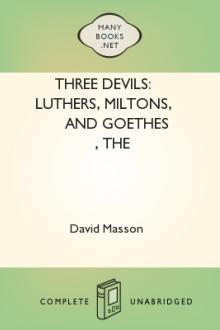Rampolli - George MacDonald (fiction book recommendations .txt) 📗

- Author: George MacDonald
Book online «Rampolli - George MacDonald (fiction book recommendations .txt) 📗». Author George MacDonald
CONTENTS.
PREFACE TO THE TRANSLATIONS
TRANSLATIONS-
FROM NOVALIS
" SCHILLER
" GOETHE
" UHLAND
" HEINE
" VON SALIS-SEEWIS
" CLAUDIUS
FROM THE DUTCH OF GENESTET
FROM THE GERMAN- Author to me unkown
FROM PETRARCH
MILTON'S ITALIAN POEMS
LUTHER'S SONG-BOOK
A YEAR'S DIARY OF AN OLD SOUL
PREFACE TO THE TRANSLATIONS.
I think every man who can should help his people to inherit the earth by bringing into his own of the wealth of other tongues. In the flower-pots of translation I offer these few exotics, with no little labour taught to exist, I hope to breathe, in English air. Such labour is to me no less serious than delightful, for to do a man's work, in the process of carrying over, more injury than must be, is a serious wrong.
I have endeavoured, first of all, to give the spirit of the poetry.
Next, I have sought to retain each individual meaning that goes to form the matter of a poem.
Third, I have aimed at preserving the peculiar mode, the aroma of the poet's style, so far as I could do it without offence to the translating English.
Fourth, both rhythm and rime being essential elements of every poem in which they are used, I have sought to respect them rigorously.
Fifth, spirit, matter, and form truly represented, the more literal the translation the more satisfactory will be the result.
After all, translation is but a continuous effort after the impossible. There is in it a general difficulty whose root has a thousand ramifications, the whole affair being but an accommodation of difficulties, and a perfect translation from one language into another is a thing that cannot be effected. One is tempted even to say that in the whole range of speech there is no such thing as a synonym.
Much difficulty arises from the comparative paucity in English of double, or feminine rimes. But I can remember only one case in which, yielding to impossibility, I have sacrificed the feminine rime: where one thing or another must go, the less valuable must be the victom.
But sometimes a whole passage has had to suffer that a specially poetic line might retain its character.
With regard to the Hymns to the Night and the Spiritual Songs of Friedrich von Hardenberg, commonly called Novalis, it is desirable to mention that they were written when the shadow of the death of his betrothed had begun to thin before the approaching dawn of his own new life. He died in 1801, at the age of twentynine. His parents belonged to the sect called Moravians, but he had become a Roman Catholic.
Perhaps some of Luther's Songs might as well have been omitted, but they are all translated that the Songbook might be a whole. Some, I cannot tell how many or which, are from the Latin. His work is rugged, and where an occasional fault in rime occurs I have reproduced it.
In the few poems from the Italian, I have found the representation of the feminine rimes, so frequent in that language, an impossibility.
FROM NOVALIS.
HYMNS TO THE NIGHT SPIRITUAL SONGS A PARABLE (From THE DISCIPLES AT SAIS)
HYMNS TO THE NIGHT.
I.
Before all the wondrous shows of the widespread space around him, what living, sentient thing loves not the all-joyous light, with its colours, its rays and undulations, its gentle omnipresence in the form of the wakening Day? The giant world of the unresting constellations inhales it as the innermost soul of life, and floats dancing in its azure flood; the sparkling, ever-tranquil stone, the thoughtful, imbibing plant, and the wild, burning, multiform beast-world inhales it; but more than all, the lordly stranger with the meaning eyes, the swaying walk, and the sweetly closed, melodious lips. Like a king over earthly nature, it rouses every force to countless transformations, binds and unbinds innumerable alliances, hangs its heavenly form around every earthly substance. Its presence alone reveals the marvellous splendour of the kingdoms of the world.
Aside I turn to the holy, unspeakable, mysterious Night. Afar lies the world, sunk in a deep grave; waste and lonely is its place. In the chords of the bosom blows a deep sadness. I am ready to sink away in drops of dew, and mingle with the ashes.-The distances of memory, the wishes of youth, the dreams of childhood, the brief joys and vain hopes of a whole long life, arise in gray garments, like an evening vapour after the sunset. In other regions the light has pitched its joyous tents: what if it should never return to its children, who wait for it with the faith of innocence?
What springs up all at once so sweetly boding in my heart, and stills the soft air of sadness? Dost thou also take a pleasure in us, dusky Night? What holdest thou under thy mantle, that with hidden power affects my soul? Precious balm drips from thy hand out of its bundle of poppies. Thou upliftest the heavy-laden pinions of the soul. Darkly and inexpressibly are we moved: joy-startled, I see a grave countenance that, tender and worshipful, inclines toward me, and, amid manifold entangled locks, reveals the youthful loveliness of the Mother. How poor and childish a thing seems to me now the light! how joyous and welcome the departure of the day!-Didst thou not only therefore, because the Night turns away from thee thy servants, strew in the gulfs of space those flashing globes, to proclaim, in seasons of thy absence, thy omnipotence, and thy return?
More heavenly than those glittering stars we hold the eternal eyes which the Night hath opened within us. Farther they see than the palest of those countless hosts. Needing no aid from the light, they penetrate the depths of a loving soul that fills a loftier region with bliss ineffable. Glory to the queen of the world, to the great prophetess of holier worlds, to the foster-mother of blissful love! she sends thee to me, thou tenderly beloved, the gracious sun of the Night. Now am I awake, for now am I thine and mine. Thou hast made me know the Night, and brought her to me to be my life; thou hast made of me a man. Consume my body with the ardour of my soul, that I, turned to finer air, may mingle more closely with thee, and then our bridal night endure for ever.
II.
Must the morning always return? Will the despotism of the earthly never cease? Unholy activity consumes the angel-visit of the Night. Will the time never come when Love's hidden sacrifice shall burn eternally? To the Light a season was set; but everlasting and boundless is the dominion of the Night. Endless is the duration of sleep. Holy Sleep, gladden not too seldom in this earthly day-labour, the devoted servant of the Night. Fools alone mistake thee, knowing nought of sleep but the shadow which, in the gloaming of the real night, thou pitifully castest over us. They feel thee not in the golden flood of the grapes, in the magic oil of the almond tree, and the brown juice of the poppy. They know not that it is thou who hauntest the bosom of the tender maiden, and makest a heaven of her lap; never suspect it is thou, the portress of heaven, that steppest to meet them out of ancient stories, bearing the key to the dwellings of the blessed, silent messenger of secrets infinite.
III.
Once when I was shedding bitter tears, when, dissolved in pain, my hope was melting away, and I stood alone by the barren hillock which in its narrow dark bosom hid the vanished form of my Life, lonely as never yet was lonely man, driven by anguish unspeakable, powerless, and no longer aught but a conscious misery;-as there I looked about me for help, unable to go on or to turn back, and clung to the fleeting, extinguished life with an endless longing: then, out of the blue distances, from the hills of my ancient bliss, came a shiver of twilight, and at once snapped the bond of birth, the fetter of the Light. Away fled the glory of the world, and with it my mourning; the sadness flowed together into a new, unfathomable world. Thou, soul of the Night, heavenly Slumber, didst come upon me; the region gently upheaved itself, and over it hovered my unbound, new-born spirit. The hillock became a cloud of dust, and through the cloud I saw the glorified face of my beloved. In her eyes eternity reposed. I laid hold of her hands, and the tears became a sparkling chain that could not be broken. Into the distance swept by, like a tempest, thousands of years. On her neck I welcomed the new life with ecstatic tears. Never was such another dream; then first and ever since I hold fast an eternal, unchangeable faith in the heaven of the Night, and its sun, the Beloved.
IV.
Now I know when will come the last morning: when the light no more scares away the Night and Love, when sleep shall be without waking, and but one continuous dream. I feel in me a celestial exhaustion. Long and weariful was my pilgrimage to the holy grave, and crushing was the cross. The crystal wave, which, imperceptible to the ordinary sense, springs in the dark bosom of the hillock against whoose foot breaks the flood of the world, he who has tasted it, he who has stood on the mountain frontier of the world, and looked across into the new land, into the abode of the Night, verily he turns not again into the tumult of the world, into the land where dwells the Light in ceaseless unrest.
On those heights he builds for himself tabernacles-tabernacles of peace; there longs and loves and gazes across, until the welcomest of all hours draws him down into the waters of the spring. Afloat above remains what is earthly, and is swept back in storms; but what became holy by the touch of Love, runs free through hidden ways to the region beyond, where, like odours, it mingles with love asleep. Still wakest thou, cheerful Light, the weary man to his labour, and into me pourest gladsome life; but thou wilest me not away from Memory's mossgrown monument. Gladly will I bestir the deedy hands, everywhere behold where thou hast need of me; bepraise the rich pomp of thy splendour; pursue unwearied the lovely harmonies of thy skilled handicraft; gladly contemplate the thoughtful pace of thy mighty, radiant clock; explore the balance of the forces and the laws of the wondrous play of countless worlds and their seasons; but true to the Night remains my secret heart, and to creative Love, her daughter. Canst
thou show me a heart eternally true? Has thy sun friendly eyes that know me? Do thy stars lay hold of my longing hand? Do they return me the tender pressure and the caressing word? Was it thou didst bedeck them with colours and a flickering outline? Or was it she who gave to thy jewels a higher, a dearer significance? What delight, what pleasure offers





Comments (0)